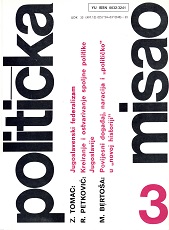Federalizam u Austriji uz poseban osvrt na vanjskopolitičke aspekte
Federalism in Austria With Special Consideration of Its Foreign Aspects
Author(s): Renate KickerSubject(s): Constitutional Law, Political Sciences, Public Administration, Government/Political systems, International relations/trade
Published by: Fakultet političkih znanosti u Zagrebu
Keywords: Federalism; Austria; Foreign Aspects;
Summary/Abstract: Austrian federalism is a result of a contest between centrifugal and centripetal forces. The federal principle was introduced into the constitution in 1920. Since then central competency's has been extensively Interpreted, limiting the role of the nine provinces. The legislative, judicial, and executive power belong in fact to the central organs, and so does the right to collect the income resulting from taxation. The constitution guarantees the participation of the provinces in the central government through the presence of the representative of provincial chairmen in the central executive power, and by a two chamber structure of Parliament in the legislature. The competency of the central council is practically reduced to the right of objection. In spite of the strong centralizing features of the Austrian federal structure the provinces continue to find new forms of collaboration and are involved in "co-operative federalism". Austrian provinces tend to realize some independent activity in terms of foreign policy on the basis of private law. The cooperation between border provinces and neighbouring countries, such as the "Alpe -Adria" community is legally based on private administration and makes not part of the international activity of the Austrian government.
Journal: Politička Misao
- Issue Year: XXIII/1986
- Issue No: 03
- Page Range: 15-21
- Page Count: 7
- Language: Croatian

